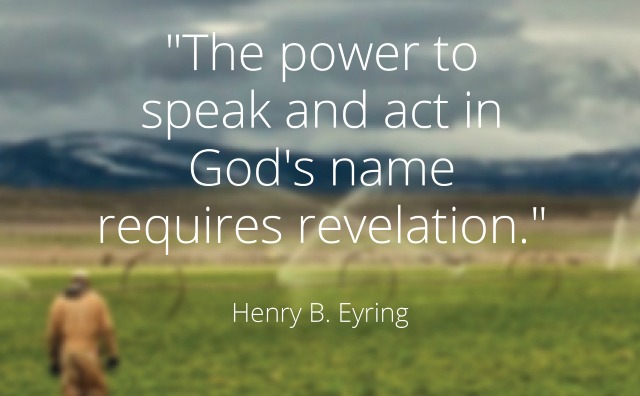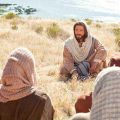Question
Dear Gramps,
Why doesn’t the Doctrine and Covenants contain more revelations? It seems like all the “Thus saith the Lord” type revelations were given way back in the early days of the Church, and any revelation given since has more to do with being guided by the inspiration of the Holy Ghost than it does by literal mind-to-mind communication with the Lord. Am I wrong?
Thanks!
Brian
Answer
Dear Brian,
There is some ambiguity as to whether or not the frequency of “Thus saith the Lord” mind-to-mind communication has declined or remained steady. In light of that ambiguity, the faithful saint can either assume the revelatory stream has been steady, or take comfort that the public references to the active voice of Providence are in line with the revelatory patterns taught by Joseph Smith.
Thus saith the Lord
Joseph was a treasured well-spring of revelation, but not all of his revelations made it into the Doctrine and Covenants. The revelations we have were prepared for publication in a manuscript book historians refer to as Revelation Book 1. In this manuscript, we not only find revelations that were canonized and attested as “given by inspiration of God, and are profitable for all men and are verily true” (Testimony of the Twelve Apostles to the Truth of the Book of Doctrine and Covenants), but also instructional items from Joseph, revelation received by Oliver Cowdery, and uncanonized revelations received by Joseph. These revelations contain the standard markers of our scriptural revelations that tell us they come from God, even including “saith the Lord“! Yet they were not officially published. Subsequent editions of the Doctrine and Covenants, with even more revelations to choose from, were equally selective about what to include. Some of these revelations were extremely narrow in scope and thus not “profitable for all men”. Some revelations repeated instruction that had previously been given in other revelations that had subsequently been published and would be redundant in book form. Other revelations “cannot be revealed unto the world” (see explanations for Facsimile 2), and were reserved for local sermons and teaching in the temple.
Then of course we have revelations that were received, but the only record we have of them is from letters. Joseph recorded the revelation commanding the saints to build the Nauvoo temple, which would house various ordinances including baptisms for the dead. But what this ordinance was, why it ought to be performed, and how it ought to be performed was not included in this revelation. This information is instead contained in two letters (epistles) where the prophet explains these details. It is quite clear that Joseph is inspired and has received a revelation (or several) on the subject, but what is also clear is that Joseph is the one explaining the doctrine based on what he’s learned and not the Lord. It is clearly inspired and based on revelation, but it is not the revelation. Had Joseph circulated this letter to church membership today, critics would blog, “well and good, but where’s the voice of the Lord?”
Our modern prophets may very well be receiving revelation in the same manner of Joseph, complete with “thus saith the Lord” proclamations. I can think of a number of blessings I have heard pronounced that have such a tone (and been honored by the Lord) – including patriarchal blessings. I see no reason why this gift would be common among the lay saints but not the anointed leaders. They could indeed receive such pronounced revelations, and yet, as with Joseph’s former revelations, there may be no need to publish them because of the narrow scope (like missionary calls and assignments), or they may be redundant (so many of the testimonies shared in General Conference contain words similar to scripture when not quoting scripture). Other revelations may be received but unpublished until the world – and Church membership – have prepared themselves to receive it. And I would be remiss if I failed to note that the two Official Declarations fit quite snugly with the baptism for the dead tradition where it is clear that a revelation was received, but the revelation itself was unrecorded. So there’s quite enough precedent in the old prophet, and ambiguity in the new prophets, to faithfully suppose that our modern prophets still hear the voice of the Lord in the same manner that Joseph did.
By the power of the Holy Ghost
In a public interview, President Gordon B. Hinckley shared his experience with prophetic revelation. I’ve mentioned it before when comparing ourcurrent prophets to earlier prophets, but include it again here with a fuller quote.
“Mr. Wallace: ‘The Mormons, Mr. President, call you a “living Moses,” a prophet who literally communicates with Jesus. How do you do that?’
“Reply: ‘Let me say first that there is a tremendous history behind this Church, a history of prophecy, a history of revelation, and … decisions which set the pattern of the Church so that there are not constant recurring problems that require any special dispensation. But there are occasionally things that arise where the will of the Lord [is needed and] is sought, and in those circumstances I think the best way I could describe the process is to liken it to the experience of Elijah as set forth in the book of First Kings. Elijah spoke to the Lord, and there was a wind, a great wind, and the Lord was not in the wind. And there was an earthquake, and the Lord was not in the earthquake. And there was a fire, and the Lord was not in the fire. And after the fire a still, small voice, which I describe as the whisperings of the Spirit. Now, let me just say, categorically, that the things of God are understood by the Spirit of God, and one must have and seek and cultivate that Spirit, and there comes understanding and it is real. I can give testimony of that.’” (This Thing Was Not Done in a Corner, October General Conference 1996).
At first blush it’s disappointing to hear that our prophet who speaks with God only does so through “a still, small voice, … the whisperings of the Spirit.” But then we see that he finds it analogous to Elijah’s revelation. Elijah was a prophet’s prophet! He took on the notorious Ahab and Jezebel. He called fire from heaven! He ascended to heaven in a chariot of fire! Malachi prophesied of his grand destiny yet to come. John the Baptist and Joseph Smith came in the spirit and power of Elijah and John the Revelator spoke of yet another prophet to come in such power! If Elijah’s prophetic greatness grew from a “still, small voice,” then sign me up!
Indeed, the modes of revelation are varied. They include not only revelation, visions, dreams, and angelic visitations, but they can scripturally be broken down as a burning of the bosom, stupor of thought, truth in your mind and in your heart, peace, inspired memories, a piercing whisper, and yes, even a still, small voice (see here and here). The common thread through all of them is that the revelation is given by the power of the Holy Ghost. Even the most dramatic of revelations come back to this. Says Nephi, “Angels speak by the power of the Holy Ghost; wherefore, they speak the words of Christ.” (2 Nephi 32:3).
Returning back to Joseph Smith, we find that even his boldest “thus saith the Lord” revelations may have come under the same medium discussed here: the power of the Holy Ghost. In preparing his revelations for publication, Joseph edited them for content and clarification. This doesn’t exactly jive with the image of a prophet if we view him as a Greek oracle that enters into a trance and recites verbatim the divine message, but it does fit in very nicely with the common experience of revelation experienced by saints around the world. How often have we prayed to give the message the Lord would have us give, write it down, and then give equally-inspired edits for content and clarity? And, having given the talk or lesson, then felt the confirming witness of the Spirit that the Lord accepted our work? Joseph’s editing of his published revelations is discussed in more detail in a 1985Ensign article, “Preparing Early Revelations for Publication” by Melvin J. Petersen.
What’s more, Joseph included other varieties of prophetic pronouncements in the Doctrine and Covenants. We’ve already covered epistles. Section 102 is the meeting minutes of first high council meeting and has become the standard for high councils everywhere. Our current leaders have encouraged us to view our local council meetings as “revelatory experiences” where the Lord’s will is manifest and it appears Joseph viewed them the same way. Councils in the highest and lowest settings, when patterned properly, become another source of revelation by the power of the Holy Ghost.
A history of recorded patterns
The final aspect of revelation is one that’s already been mentioned by President Hinckley. He observed, “Let me say first that there is a tremendous history behind this Church, a history of prophecy, a history of revelation, and … decisions which set the pattern of the Church so that there are not constant recurring problems that require any special dispensation.” I noted earlier that a number of revelations were excluded from the Doctrine and Covenants because they were redundant. Similarly, we don’t need fresh canonized pronouncements of the grandeur of God and the grace of Christ (we do, however, get these revealed pronouncements steadily in General Conference). This is in accordance with a patter Joseph Smith himself set. Joseph instructed the early apostles on how they should run their councils and told them to take particular minutes (returning again to councils as revelatory instruments).
“It is a fact, if I now had in my possession, every decision which had been had upon important items of doctrine and duties since the commencement of this work, I would not part with them for any sum of money; but we have neglected to take minutes of such things, … which, if we had them now, would decide almost every point of doctrine which might be agitated. But this has been neglected, and now we cannot bear record to the Church and to the world, of the great and glorious manifestations which have been made to us with that degree of power and authority we otherwise could, if we now had these things to publish abroad.
“… If [the Twelve] will, every time they assemble, appoint a person to preside over them during the meeting, and one or more to keep a record of their proceedings, and on the decision of every question or item, be it what it may, let such decision be written, and such decision will forever remain upon record, and appear an item of covenant or doctrine. An item thus decided may appear, at the time, of little or no worth, but should it be published, and one of you lay hands on it after, you will find it of infinite worth, not only to your brethren, but it will be a feast to your own souls.
“Here is another important item. If you assemble from time to time, and proceed to discuss important questions, and pass decisions upon the same, and fail to note them down, by and by you will be driven to straits from which you will not be able to extricate yourselves, because you may be in a situation not to bring your faith to bear with sufficient perfection or power to obtain the desired information; or, perhaps, for neglecting to write these things when God had revealed them, not esteeming them of sufficient worth, the Spirit may withdraw, and God may be angry; and there is, or was, a vast knowledge, of infinite importance, which is now lost. … Now, if you will be careful to keep minutes of these things, as I have said, it will be one of the most important records ever seen: for all such decisions will ever after remain as items of doctrine and covenants.” (Teachings of the Prophet Joseph Smith, pg. 72-74).
There’s a parallel to a newly called bishop or branch president. When you are handed the job to preside over a Church unit, you’re afraid you’re going to do something wrong, offend people, or screw things up. You tend to pray over everything constantly. The Lord provides abundant guidance. There’s almost an overwhelming, constant flow of personal revelation to assist you. This is the “thus saith the Lord” period for a new leader.
After a couple of years, you have experience, better judgment, and you’ve become more acquainted with the “mind of the Lord” in regards to your responsibilities. The Lord’s guidance becomes more subtle at this point. It’s still there, but you just know from experience (and your “doctrine and covenants” of minutes) what you need to do and, when something out-of-the-ordinary pops up, you are accustomed to approaching the Lord and his responding in a particular way. The “thus saith the Lord” moments seem to happen less frequently.
Revelation every day
Elder John A. Widtsoe described it this way:
“There is, in view of what has been said, need of continuous revelation. However, we must understand that there are two classes of revelation given by God to man. The first deals with the structure and content of the plan of salvation. Once given it does not need to be given again. Adam received it. … Christ gave the same revelation to man in His dispensation. So did Joseph Smith in his dispensation. The foundation, or platform, once given does not need to be given again unless men forget the truth.
“Then there are revelations that fit the changes in our lives, meet our new needs, help us overcome unforeseen conditions—revelations for our daily guidance.
“This great country, the United States of America, has found itself in a great depression. We have the Gospel. What did the Lord do? He spoke to his Prophet, and we have what is known as theWelfare Program. It is the application of the eternal principles of the Gospel to present day needs. It is as revelation. We have that type of revelation continuously.
“So, when people say: ‘We ought to have revelation now as we did in the day of Joseph,’ we must answer, ‘Open your eyes; we do have revelation every day; such as we need from day to day.’
“Revelations have been given to Joseph Smith, Brigham Young, John Taylor, Wilford Woodruff, Lorenzo Snow, Joseph F. Smith and President Heber J. Grant. Every one of them has had revelation whereby the Church has been guided.” (John A. Widtsoe, “Modern Revelation and Modern Questions,” The Deseret News, Church Section, 28 January 1939, p. 6.)
With the scaffolding in place, the Lord is largely working with the councils He organized for the purpose of revealing many great and important things pertaining to the kingdom of God. The scaffolding only needs to be revealed again in the case of general apostasy. These councils, including the current prophet, receive revelation from God by the power of the Holy Ghost. They may even hear the voice of the Lord the same way that Joseph did. I would dare say that, given that the practices we find today can be traced to precedents set by the prophet Joseph, if he were alive today the question would still be asked as to why he seemed to receive more “thus saith the Lord” revelations when he was younger. Regardless, The Church of Jesus Christ is a church of revelation from the highest leader down to the newest member, and questions like this can be better understood and resolved as we personally come to understand the spirit of revelation.
Gramps







